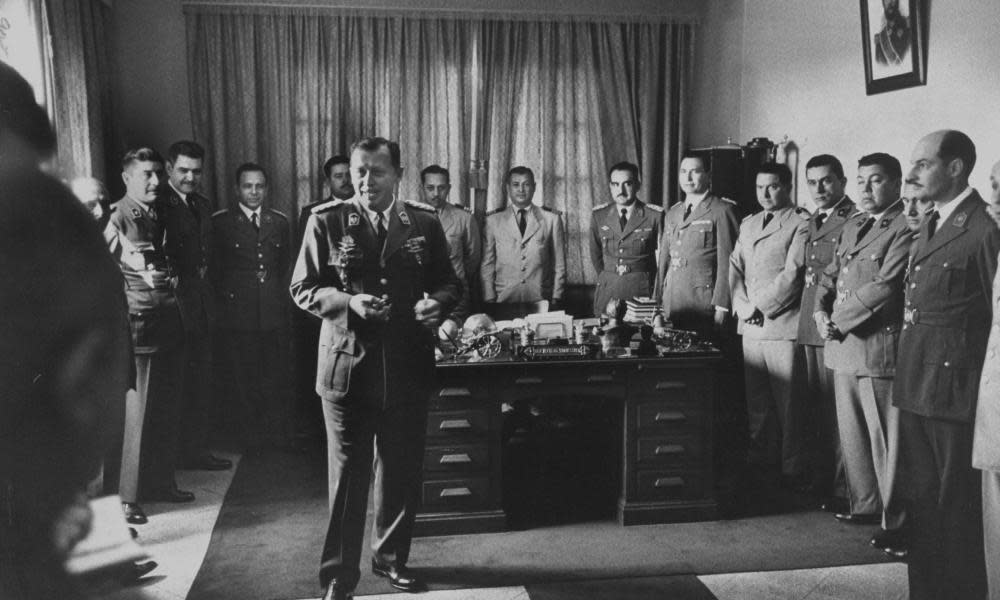Past weighs heavy as Paraguay struggles with ghosts of dictatorship

For decades, it was known as the fecha feliz – the happy date – a cheerful-sounding name for the annual commemoration of South America’s longest-ruling military dictator.
Paraguay’s General Alfredo Stroessner used the nationwide birthday party as an element of his carefully cultivated cult of personality. And the celebration has shown enormous staying power, surviving both the coup that toppled Stroessner in 1989 and his death in exile in Brazil in 2006.
But this 3 November, the General Stroessner polka – the celebration’s traditional adulatory soundtrack – was barely heard in the capital city. Instead, Asunción rang with music from anti-Stroessner parties.
As José Caballero, who organized one such event, put it: “We’re dancing on Stroessner’s grave; we’re fighting back with joy.”
In recent years, the best-known pro-Stroessner celebrations have practically disappeared as a generation of supporters from the dictatorship years gradually dies off.
But Paraguay has yet to fully confront the crimes and the legacy of military rule.
Related: Why is inequality booming in Chile? Blame the Chicago Boys | Richard Davies
And as recent events in South America have shown, authoritarian pasts can weigh heavily on countries decades after democratic transition, despite outward signs of change. Chile is now well into its second month of turmoil, fueled in part by anger over the neoliberal policies introduced by Augusto Pinochet.
Fernando Robles, a Paraguayan lawyer, argues that his country has still not shaken off the dead hand of dictatorship.
He spent three years in prison for belonging to a clandestine anti-Stroessner movement – “We were all tortured. Horrifically tortured, as was the custom of Stroessner and his police force” – but Robles worries that many in his country do not understand the lessons of the past.
“Today, a 15-year-old or an 18-year-old doesn’t even know that Stroessner existed. The education system doesn’t mention the dictatorship. There is no intention of teaching the past so that it doesn’t repeat itself.”
Paraguay’s relationship with its troubled past was thrust into the spotlight in September, by the discovery of human remains at a house once owned by Stroessner.
The remains are still under analysis to determine if they are from victims of the dictatorship, said Dr Rogelio Goiburú, head of the justice ministry’s department for historical memory and reparation.
Goiburú has every reason to want to uncover the truth about the dictatorship’s crimes: his own father was murdered by Stroessner’s regime.
“All imaginable crimes were committed under Stroessner,” he said.
Political opponents were forcibly disappeared, young girls were sexually enslaved by high-ranking officials, members of the LGBT community were targeted and indigenous peoples faced violence that has been labelled as genocide.
A 2008 report from the Paraguayan Truth and Justice Commission found that at least 423 people were murdered, 18,722 tortured and 3,470 forced into exile during the dictatorship.
“In reality, thousands of people were probably killed,” said Goiburú.
Yet so far, the remains of only 37 victims have been found – and just four have been identified. Although names of hundreds of perpetrators were revealed to the commission, only a handful have been prosecuted.
Goiburú says the government does not give his department the resources, pointing to his tiny, flood-prone office as an indicator of how much politicians value his work.
Opposition senator Esperanza Martínez, who opposed the dictatorship, said authorities refuse to address the past because the regime is still alive and well.
“The end of the dictatorship was really just a reshuffle of the same old system by the protagonists of the regime itself,” she said. “They left the same political and economic models intact.”
Unlike Chile, Paraguay rewrote its constitution after the fall of the dictatorship, but the conservative Colorado party – a key pillar of Stroessner’s regime – has held the presidency for 25 of the 30 years since the beginning of free multi-party elections. The current president, Mario Abdo Benítez, is the son of Stroessner’s personal secretary.
In September, Colorado legislators showed allegiance to their old chief by blocking a law that identified the Stroessner era as a dictatorship.
According to Luis Rojas, an economist, Paraguay has the world’s highest inequality of land ownership as a product of Stroessner’s legacy. In an agricultural nation, where land is the main source of wealth, at least 85% of agricultural land is held by just 2.5% of landowners.
Related: 'The constitution of the dictatorship has died': Chile agrees deal on reform vote
Rojas said: “Stroessner fraudulently distributed almost 7m hectares of state-owned land [almost 17% of Paraguay’s total surface area] to politicians, soldiers and business people who were close to his government.”
Rojas said post-dictatorship governments have done effectively nothing to recover this ill-gotten land, and instead have implemented policies that favour further concentration at the expense of the small-scale farmer and indigenous sectors.
Against the backdrop of recent political upheavals across South America, Robles said that Paraguay’s immense economic, political and social imbalances are simply unsustainable.
“It’s true that Paraguay is far behind in comparison with Chile, Ecuador and Bolivia, where people protest openly. But at some point, our economic and social reality is going to have to explode. Not yet, but it will explode.”

